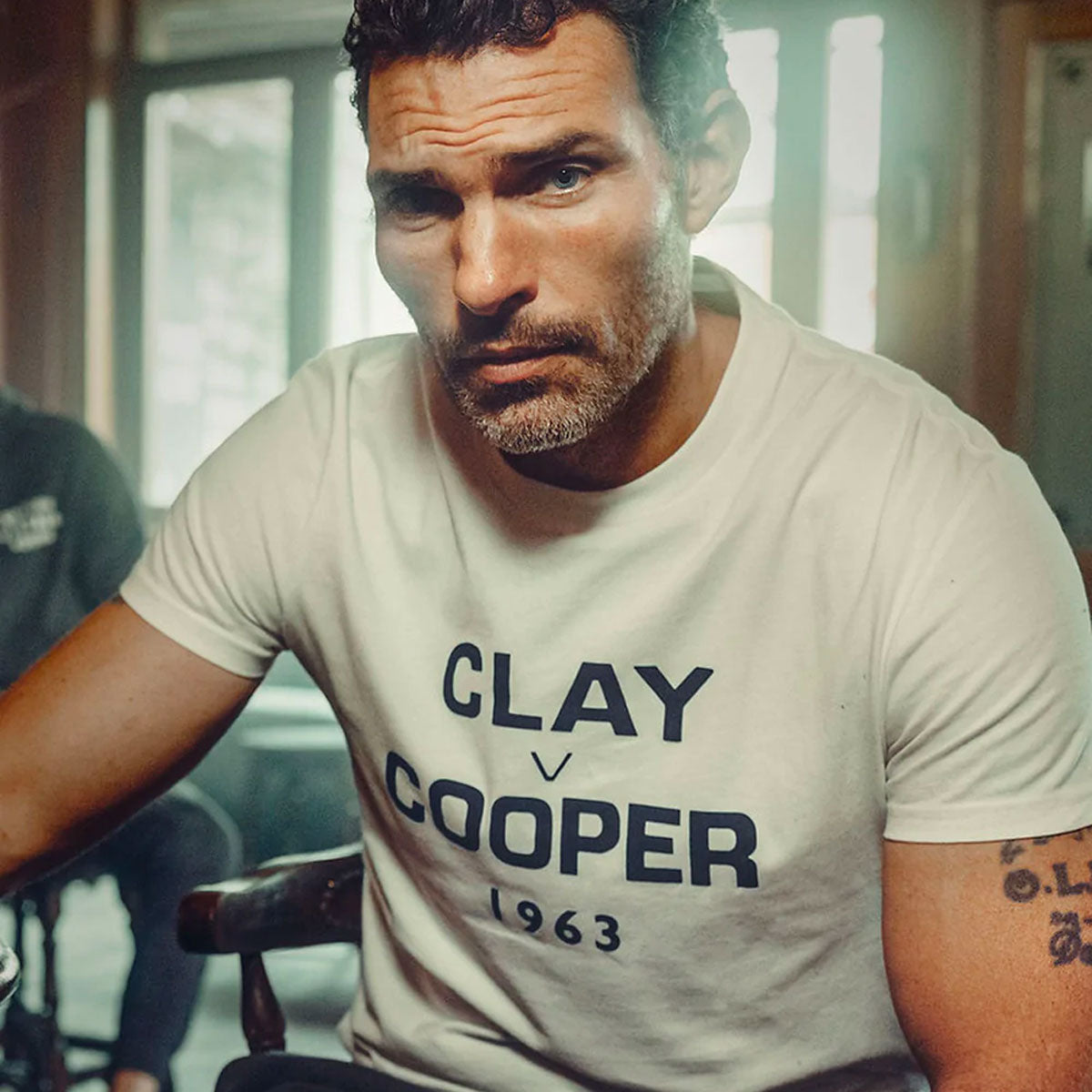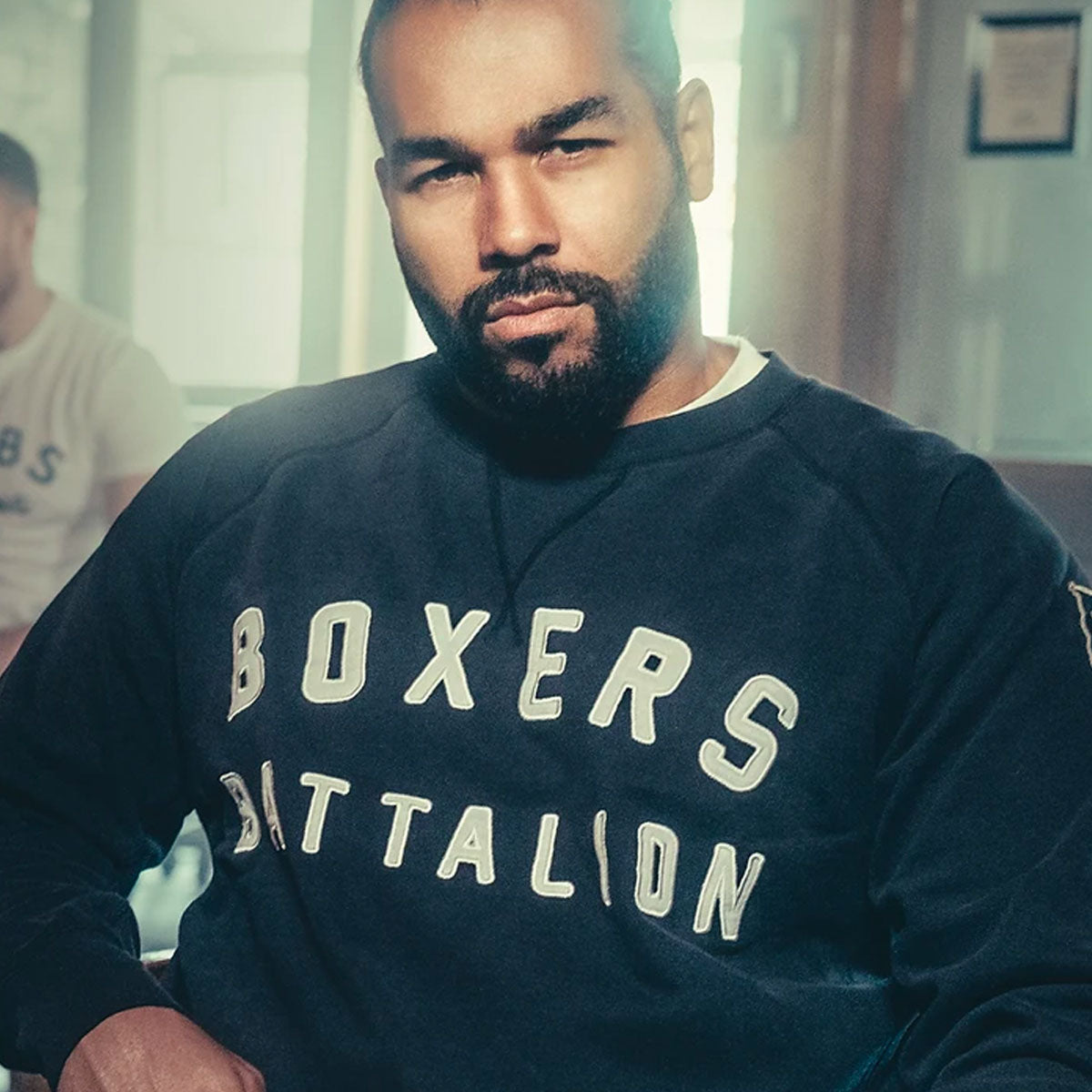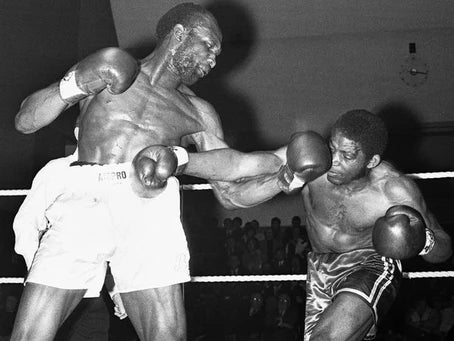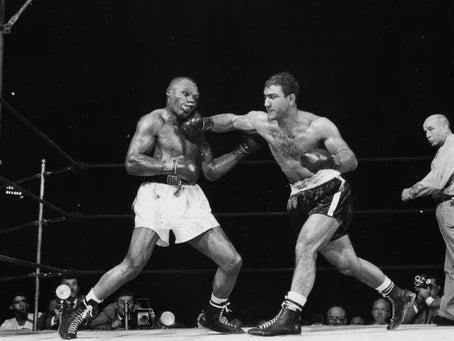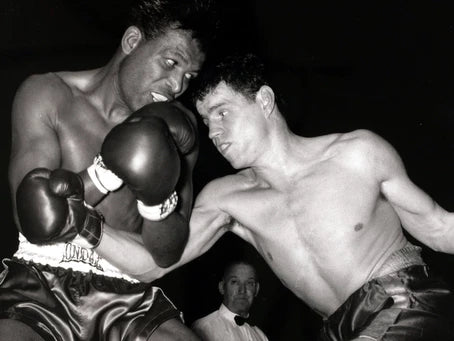Contributed by Sportswriter Paul Zanon
It’s been 45 years since Britain crowned its first ever black heavyweight champion in Bunny Johnson. However, the 73 year old Jamaican born British resident has far more to his resume than that single crowning moment.

Part of the Windrush generation, Bunny Johnson moved from Jamaica to the UK at the age of 16. His amateur boxing record read an impressive 32-4 and at the age of 20, on 8 February 1968 against Peter Thomas, at Colston Hall, Bristol, Birmingham’s favourite adopted son made his debut, stopping Thomas in one minute and 15 seconds of round two.
A natural light heavyweight, Johnson spent the first part of his career hovering between 180lbs – 185lbs, operating as a heavyweight. Similar to Rocky Marciano, in today’s boxing parameters, he would have been a skinny cruiserweight.
Following his destruction of Thomas, in the coming nine months, Johnson would fight a further 10 times, racking up nine more wins, but also incurring his first loss, a sixth round knockout against Nigerian born Guinea Roger, a hard hitting journeyman who came with a fierce reputation of knocking out 11 of his 13 opponents who he defeated. Unfortunately for Johnson, six weeks later he was knocked out again in the sixth session, but this time by Yorkshire Southpaw, Roger Tighe.
Despite amassing three wins over the next four months, a rematch with Tighe on 27 August 1969 would again, end in defeat, with the Hull resident winning the contest on points over the 10 round distance. They would cross paths three years later, with Johnson finally gaining a points victory over Tighe, however, the Yorkshireman came out on top of the trilogy. Guinea Roger on the other hand, fought Johnson a total of five times, however, the Harlesden resident would come off worse in four of those encounters.
In his next 12 outings, Johnson won nine and incurred three losses, including a contest against up and coming heavyweight, Richard Dunn, who outweighed Johnson by 21lbs. During this time, under the management wings of esteemed East Midlands figure George Biddles, Johnson started training at Swandlincote gym where he had some fierce spars with Jack Bodell and Joe Bugner.
Bodell overlapped in the heavyweight division with Johnson, went on to win British, Commonwealth and European honours in a career which spanned 71 fights, but they never locked horns. However, it was a sparring session with Henry Copper in 1970 which really put Johnson on the map and grabbed the media’s undivided attention.

Rumour has it that Johnson was paid £20 per round and gained the upper hand during that session. However, as the expression goes, ‘Sparring in the gym, fighting in the ring.’ A licenced contest between the pair would have made for great viewing, with both fighters sharing a common tool – a destructive left hook.
By October 1971, the humble Brummie’s record stood at 26-6, which was hardly the resume for a future two weight champion. However, it all comes down to opportunity and those doors opening at the right time. Unfortunately, arriving in the UK with foreign credentials meant that Johnson wasn’t eligible to fight for the British title due to legislation requiring all foreign nationals to be residents in the United Kingdom for 10 years. Consequently, it could be argued that Johnson’s best years at British level were never fully recognised. Mickey Duff once said to Johnson. ‘The only thing a black fighter brought to a boxing show was his bag.’ At the time there were not a lot of us, we were a new breed of people. (Birmingham Mail)
After a long wait, on 5 June 1973, Johnson fought Reading boxer, Les Stevens, with the contest acting as an eliminator for the British Heavyweight title. Stevens was a genuine test for Johnson. The Berkshire favourite was four years Johnson’s junior, was naturally bigger and carried a record of 15 wins and one loss.
Despite being the underdog, Johnson secured a clear points victory over Stevens. Over the next 10 months, Stevens would win two fights, earning him the Southern Area heavyweight crown and lose two very respectable contests, lasting the distance against John Conteh and American Jimmy Young.
Johnson in the meantime was now on a mission to get his name firmly engrained in British boxing history. Four months after the Stevens bout, on 11 October 1973 at Kings Hall, Manchester, Johnson knocked out Richard Dunn in the tenth of 12 scheduled rounds. The fight acted as a final eliminator for the British heavyweight title.
After Dunn, Johnson patiently bided his time, clocking up three wins in 1974, before being presented with the opportunity to fight for the British and Commonwealth heavyweight crowns on 13 January 1975 at the Grosvenor House, Mayfair. His opponent, Northern Ireland born Danny McAlinden hadn’t come to make up the numbers. Bestowed with a very appropriate moniker of ‘Dangerous,’ with 28 career knockouts in 31 wins, McAlinden was also now a Midlands resident and in fact, had sparred with Johnson prior to the contest.


However, come fight night, Johnson proved too much for his younger adversary. Despite a head clash in the fifth round which caused a cut on McAlinden’s left eyelid, Johnson was in crunching form and knocked out his opponent in the ninth session. Not only did Johnson pick up two belts, but he made his way into the record books as the first black fighter to win the British heavyweight title.

Despite four successive wins, after McAlinden, Johnson lost his titles to old adversary Richard Dunn on 30 September 1975, only eight months after winning them. Despite a gallant effort from Johnson, who weighed 186lbs, the towering Dunn, at 211lbs took a comfortable points decision over 15 rounds at Empire Pool, Wembley. In his next four contests, Dunn knocked out McAlinden in two rounds, Bernd August in three, to become the European champion and unsuccessfully challenged ‘The Greatest,’ getting stopped in five rounds by Muhammad Ali, but in doing so, coming back to a hero’s return in his beloved Yorkshire.
Two months later, on 1 December 1975, Johnson travelled to Carlow Park in Auckland, New Zealand, taking on unbeaten Tongan prospect Fonomanu Young Sekona, who boasted a record of 18-0 and weighed 14lbs more than Johnson. Despite being five years Johnson’s junior, the Tongan was no match for Bunny’s power and ring craft, falling victim to a second round knockout.

After a draw against Billy Aird in March 1976 for a British heavyweight title eliminator, followed two months later by an eighth round stoppage against American Duane Bobick (who was 35-0 at the time), Johnson decided to try his worth at light heavyweight. It was a wise, if not natural decision as most of his fights up to that point as a heavyweight had only ever been a few pounds north of the light heavyweight limit.
On 27 September 1976, weighing in at a trim 174lbs, Johnson embarked on stage two of his career, stopping Peter Brisland in the seventh round at World Sporting Club, Mayfair. Three months later he stopped Phil Martin in the tenth round of a British light heavyweight title final eliminator before taking on Tim Wood for the British light heavyweight title on 8 March 1977 at Civic Hall, Wolverhampton.
Wood had knocked out Guinea Roger, lost on points to Richard Dunn, but was simply not in the league of Johnson. After only one minute and 43 seconds of the first round, Johnson was now a two-weight British champion, furthering cementing his place in boxing history
After two further stoppage victories, Johnson took on the Italian light heavyweight champion, Aldo Traversaro at the Palazzo Dello Sport in Genoa, for the vacant European light heavyweight title. Despite a gutsy performance from Johnson, the Italian, who went into the contest with only two losses in 48 fights, proved to be too much on the night, stopping Johnson in the eleventh session.
After his battle in Italy, in his next 14 contests, Johnson became somewhat of a road warrior, competing in five different countries. Walking away with two losses and two wins in his next four fights (one victory of note was against a rising talent by the name of Dennis Andries), on 13 May 1979, Johnson stopped Rab Affleck in four rounds at St Andrew’s Sporting Club, Glasgow, making the first defence of his British light heavyweight title.
After losing three consecutive fights against fierce opposition, on 27 February 1980, Johnson successfully defended his British crown against Kronk fighter Dennis Andries, over a 15 round slugfest. In doing so, he earned himself the coveted Lonsdale belt.
The Andries fight was Johnson’s British swansong as his next fight was in Norway and his last four in Australia. Well past his best, Johnson still mixed good company, losing against Kenyan John Odhiambho on points and Tony Mundine via tenth round stoppage. He did however manage to stop Mike Quarry (Jerry’s brother) in seven rounds.
Johnson’s last contest was against Steve Aczel on 18 September 1981 in Brisbane Australia. Losing via sixth round stoppage, Johnson retired at the age of 34, with a very respectable record of 55-17-1 in 73 contests spanning 13 years. He ended up staying Down Under for a further seven years setting up a security firm in Sydney, before returning to the Midlands to study law at Wolverhampton University.

In addition to owning nightclubs and bars in the Birmingham area, Johnson was married three times with eight children and is still involved in boxing as a representative of the Midlands Boxing Council. In October 2016, Johnson received another deserving instalment to his already well stocked trophy cabinet after being inducted into the British Ex-Boxers Hall of Fame.
Paul Zanon, has had nine books published, with almost all of them reaching the No1 Bestselling spot in their respective categories on Amazon. He has co-hosted boxing shows on Talk Sport, been a pundit on London Live, Boxnation and has contributed to a number of boxing publications, including, Boxing Monthly, The Ring, Daily Sport, Boxing News, Boxing Social, amongst other publications.
It’s been 45 years since Britain crowned its first ever black heavyweight champion in Bunny Johnson. However, the 73 year old Jamaican born British resident has far more to his resume than that single crowning moment.

Part of the Windrush generation, Bunny Johnson moved from Jamaica to the UK at the age of 16. His amateur boxing record read an impressive 32-4 and at the age of 20, on 8 February 1968 against Peter Thomas, at Colston Hall, Bristol, Birmingham’s favourite adopted son made his debut, stopping Thomas in one minute and 15 seconds of round two.
A natural light heavyweight, Johnson spent the first part of his career hovering between 180lbs – 185lbs, operating as a heavyweight. Similar to Rocky Marciano, in today’s boxing parameters, he would have been a skinny cruiserweight.
Following his destruction of Thomas, in the coming nine months, Johnson would fight a further 10 times, racking up nine more wins, but also incurring his first loss, a sixth round knockout against Nigerian born Guinea Roger, a hard hitting journeyman who came with a fierce reputation of knocking out 11 of his 13 opponents who he defeated. Unfortunately for Johnson, six weeks later he was knocked out again in the sixth session, but this time by Yorkshire Southpaw, Roger Tighe.
Despite amassing three wins over the next four months, a rematch with Tighe on 27 August 1969 would again, end in defeat, with the Hull resident winning the contest on points over the 10 round distance. They would cross paths three years later, with Johnson finally gaining a points victory over Tighe, however, the Yorkshireman came out on top of the trilogy. Guinea Roger on the other hand, fought Johnson a total of five times, however, the Harlesden resident would come off worse in four of those encounters.
In his next 12 outings, Johnson won nine and incurred three losses, including a contest against up and coming heavyweight, Richard Dunn, who outweighed Johnson by 21lbs. During this time, under the management wings of esteemed East Midlands figure George Biddles, Johnson started training at Swandlincote gym where he had some fierce spars with Jack Bodell and Joe Bugner.
Bodell overlapped in the heavyweight division with Johnson, went on to win British, Commonwealth and European honours in a career which spanned 71 fights, but they never locked horns. However, it was a sparring session with Henry Copper in 1970 which really put Johnson on the map and grabbed the media’s undivided attention.

Rumour has it that Johnson was paid £20 per round and gained the upper hand during that session. However, as the expression goes, ‘Sparring in the gym, fighting in the ring.’ A licenced contest between the pair would have made for great viewing, with both fighters sharing a common tool – a destructive left hook.
By October 1971, the humble Brummie’s record stood at 26-6, which was hardly the resume for a future two weight champion. However, it all comes down to opportunity and those doors opening at the right time. Unfortunately, arriving in the UK with foreign credentials meant that Johnson wasn’t eligible to fight for the British title due to legislation requiring all foreign nationals to be residents in the United Kingdom for 10 years. Consequently, it could be argued that Johnson’s best years at British level were never fully recognised. Mickey Duff once said to Johnson. ‘The only thing a black fighter brought to a boxing show was his bag.’ At the time there were not a lot of us, we were a new breed of people. (Birmingham Mail)
After a long wait, on 5 June 1973, Johnson fought Reading boxer, Les Stevens, with the contest acting as an eliminator for the British Heavyweight title. Stevens was a genuine test for Johnson. The Berkshire favourite was four years Johnson’s junior, was naturally bigger and carried a record of 15 wins and one loss.
Despite being the underdog, Johnson secured a clear points victory over Stevens. Over the next 10 months, Stevens would win two fights, earning him the Southern Area heavyweight crown and lose two very respectable contests, lasting the distance against John Conteh and American Jimmy Young.
Johnson in the meantime was now on a mission to get his name firmly engrained in British boxing history. Four months after the Stevens bout, on 11 October 1973 at Kings Hall, Manchester, Johnson knocked out Richard Dunn in the tenth of 12 scheduled rounds. The fight acted as a final eliminator for the British heavyweight title.
After Dunn, Johnson patiently bided his time, clocking up three wins in 1974, before being presented with the opportunity to fight for the British and Commonwealth heavyweight crowns on 13 January 1975 at the Grosvenor House, Mayfair. His opponent, Northern Ireland born Danny McAlinden hadn’t come to make up the numbers. Bestowed with a very appropriate moniker of ‘Dangerous,’ with 28 career knockouts in 31 wins, McAlinden was also now a Midlands resident and in fact, had sparred with Johnson prior to the contest.


However, come fight night, Johnson proved too much for his younger adversary. Despite a head clash in the fifth round which caused a cut on McAlinden’s left eyelid, Johnson was in crunching form and knocked out his opponent in the ninth session. Not only did Johnson pick up two belts, but he made his way into the record books as the first black fighter to win the British heavyweight title.

Despite four successive wins, after McAlinden, Johnson lost his titles to old adversary Richard Dunn on 30 September 1975, only eight months after winning them. Despite a gallant effort from Johnson, who weighed 186lbs, the towering Dunn, at 211lbs took a comfortable points decision over 15 rounds at Empire Pool, Wembley. In his next four contests, Dunn knocked out McAlinden in two rounds, Bernd August in three, to become the European champion and unsuccessfully challenged ‘The Greatest,’ getting stopped in five rounds by Muhammad Ali, but in doing so, coming back to a hero’s return in his beloved Yorkshire.
Two months later, on 1 December 1975, Johnson travelled to Carlow Park in Auckland, New Zealand, taking on unbeaten Tongan prospect Fonomanu Young Sekona, who boasted a record of 18-0 and weighed 14lbs more than Johnson. Despite being five years Johnson’s junior, the Tongan was no match for Bunny’s power and ring craft, falling victim to a second round knockout.

After a draw against Billy Aird in March 1976 for a British heavyweight title eliminator, followed two months later by an eighth round stoppage against American Duane Bobick (who was 35-0 at the time), Johnson decided to try his worth at light heavyweight. It was a wise, if not natural decision as most of his fights up to that point as a heavyweight had only ever been a few pounds north of the light heavyweight limit.
On 27 September 1976, weighing in at a trim 174lbs, Johnson embarked on stage two of his career, stopping Peter Brisland in the seventh round at World Sporting Club, Mayfair. Three months later he stopped Phil Martin in the tenth round of a British light heavyweight title final eliminator before taking on Tim Wood for the British light heavyweight title on 8 March 1977 at Civic Hall, Wolverhampton.
Wood had knocked out Guinea Roger, lost on points to Richard Dunn, but was simply not in the league of Johnson. After only one minute and 43 seconds of the first round, Johnson was now a two-weight British champion, furthering cementing his place in boxing history
After two further stoppage victories, Johnson took on the Italian light heavyweight champion, Aldo Traversaro at the Palazzo Dello Sport in Genoa, for the vacant European light heavyweight title. Despite a gutsy performance from Johnson, the Italian, who went into the contest with only two losses in 48 fights, proved to be too much on the night, stopping Johnson in the eleventh session.
After his battle in Italy, in his next 14 contests, Johnson became somewhat of a road warrior, competing in five different countries. Walking away with two losses and two wins in his next four fights (one victory of note was against a rising talent by the name of Dennis Andries), on 13 May 1979, Johnson stopped Rab Affleck in four rounds at St Andrew’s Sporting Club, Glasgow, making the first defence of his British light heavyweight title.
After losing three consecutive fights against fierce opposition, on 27 February 1980, Johnson successfully defended his British crown against Kronk fighter Dennis Andries, over a 15 round slugfest. In doing so, he earned himself the coveted Lonsdale belt.
The Andries fight was Johnson’s British swansong as his next fight was in Norway and his last four in Australia. Well past his best, Johnson still mixed good company, losing against Kenyan John Odhiambho on points and Tony Mundine via tenth round stoppage. He did however manage to stop Mike Quarry (Jerry’s brother) in seven rounds.
Johnson’s last contest was against Steve Aczel on 18 September 1981 in Brisbane Australia. Losing via sixth round stoppage, Johnson retired at the age of 34, with a very respectable record of 55-17-1 in 73 contests spanning 13 years. He ended up staying Down Under for a further seven years setting up a security firm in Sydney, before returning to the Midlands to study law at Wolverhampton University.

In addition to owning nightclubs and bars in the Birmingham area, Johnson was married three times with eight children and is still involved in boxing as a representative of the Midlands Boxing Council. In October 2016, Johnson received another deserving instalment to his already well stocked trophy cabinet after being inducted into the British Ex-Boxers Hall of Fame.
Paul Zanon, has had nine books published, with almost all of them reaching the No1 Bestselling spot in their respective categories on Amazon. He has co-hosted boxing shows on Talk Sport, been a pundit on London Live, Boxnation and has contributed to a number of boxing publications, including, Boxing Monthly, The Ring, Daily Sport, Boxing News, Boxing Social, amongst other publications.


